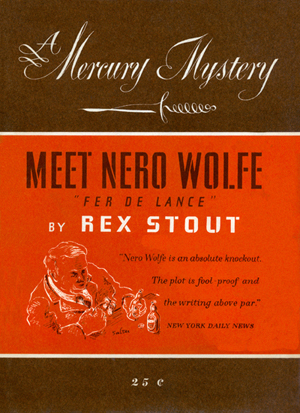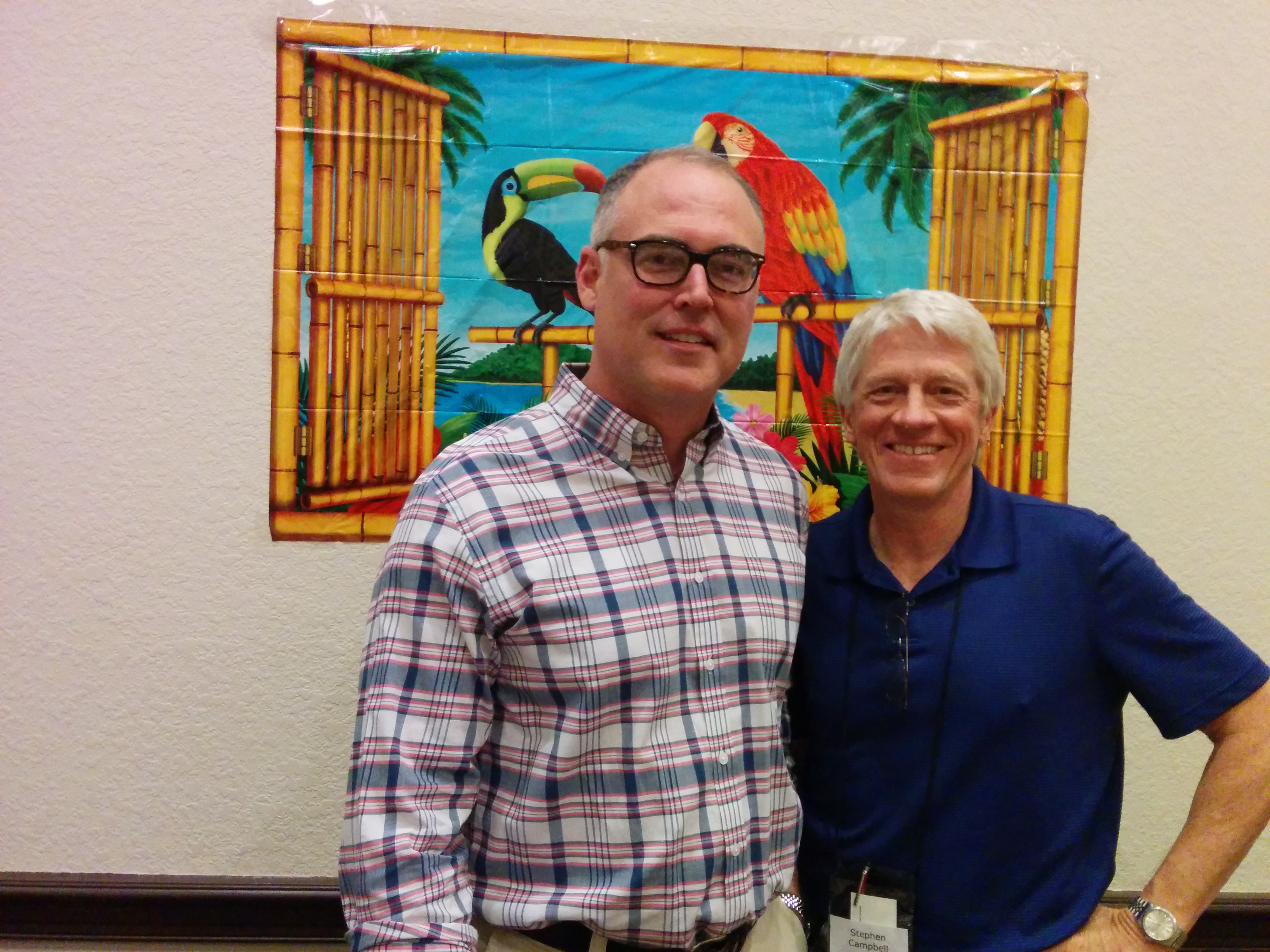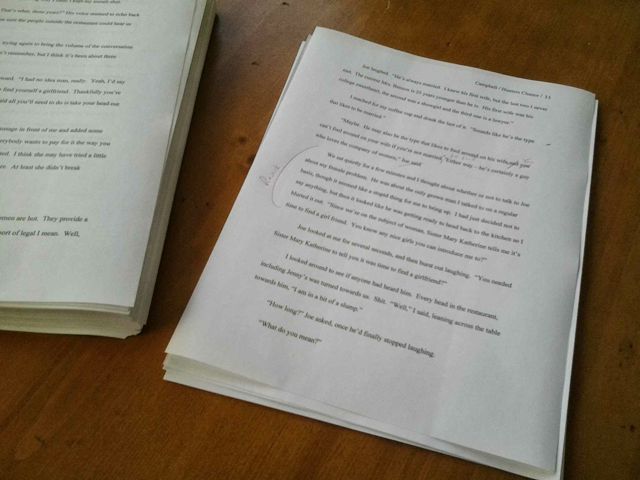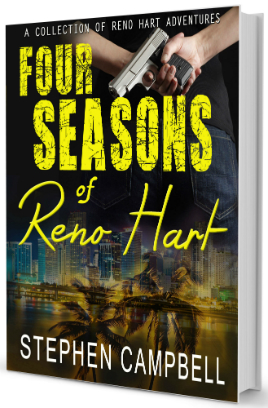by Stephen Campbell | Mar 10, 2014 | Writing
As you may know, I’m not a kid. I was fifty-five years old when I decided I wanted to write. I’ve been taking classes, reading books, talking to authors, and, most importantly, writing since I decided it was something I really wanted to do.

Image via Wikipedia
I’ve written a number of unbelievably bad manuscripts while I’ve been learning, but I’ve gotten better. One thing that always concerned me was that I’d come to the business of writing too late. Surely you need to start when you’re young to be successful, right?
The short answer is no, but I didn’t fully realize it until this past weekend.
I had the opportunity to spend some time with Laura Lippman at Sleuthfest, in Orlando over the weekend. She’s the New York Times, best selling author of the Tess Monaghan series, as well as the winner of virtually every award for excellence in the crime fiction genre. When I mentioned the age issue, she shook her head, saying she knew of plenty of authors who started at around my age, including some that had achieved great success. She was far too polite to tell me to get over myself, and just do the work.
I’d missed Hank Phillippi Ryan’s keynote address on Thursday, but I purchased the audio recording. Hank’s a big star in the writing world and is a vibrant, glamorous woman. Imagine my surprise when, during her introduction, I learned that she started writing at age fifty-five.
So I did a little research, trying to find well known authors who had their first books published while they were, ahem, getting along in years. Here are just a few of the ones I found:
- Frank McCort, the author of ANGELA’S ASHES, had his first book published at age sixty-six.
- Laura Ingalls Wilder, the Author of the Little House series, was first published in her mid sixties.
- Raymond Chandler had his first novel, THE BIG SLEEP, published at age fifty-one.
- Rex Stout was forty-eight when he published the first of thirty-three novels and thirty-nine short stories featuring Nero Wolfe. He was eighty-nine when his last book was published.
It looks like this whole second act career idea is not so wild after all.
Are you in your mid-fifties, and thinking of writing? There’s nothing stopping you. But do us both a favor before you dash something off and click that publish button. Take some classes, read some books on craft, put some time in learning how to write. Then, practice, practice, practice, while you’re continuing to learn.
From one middle aged beginning writer to another, it’s not nearly as easy as it seems like it will be when you’re reading. But, it’s not so hard that you can’t put the time in and write something that’s pretty good. If you’ve always wanted to write a novel, and you’re willing to put the time in, then do it. I suspect you’ll amaze yourself.
by Stephen Campbell | Mar 5, 2014 | Writing
Like all new writers, I’ve been searching for the secret. The key that unlocks the door to writing success. The key that the big time, successful writers have that beginning writers must try and learn. In other words, I’m searching for the Holy Grail of writing.
Well, I got lucky and was able to discover this key at Sleuthfest 2014, in Orlando over the past weekend.
If you’re not familiar with Sleuthfest, it’s the annual conference of the Florida chapter of the Mystery Writers of America. This year’s conference was the 20th.
The conference is primarily for writers, but there were a number of mystery fans there as well, taking advantage of the opportunity to learn from, and hang out with, some of the top writers in the crime fiction genre. This year there were three Guests of Honor. Laura Lippman, Ace Atkins, and Hank Phillippi Ryan. All of the three gave keynote speeches and sat in on a variety of panels.
The panels, primarily educational, ran the gamut from craft related subjects, like plotting, revising and the use of setting in books, to the more detailed and technical issues involved in this new era of publishing. Things like audio book creation, the use of social media to build author platforms, and techniques for partnering with other authors to cross promote one another’s work.
There were also opportunities to meet with agents and editors, as well as roundtable discussions with each of these well-dressed types.
I went to as many panels as possible, looking for the secret. Successful, published authors, most of whom had many books under their belts, populated each panel. Surely they had the secret.
I listened closely, took notes where I could, and then reviewed them at night, looking for this key, or secret. I had many questions on how things SHOULD be done if one hopes to become a successful writer.
One of those questions involved plotting. What do successful writers do about plotting? Do they outline, write a detailed synopsis and then use it as a blueprint for their bestselling novels? Well, I quickly got the answer to that question when a moderator asked the audience how many plotted their novels ahead of time. About half raised their hands. She then asked how many wrote by the seat of their pants. The other half raised their hands. Interesting. Obviously half were doing it correctly and half were not.
Then the moderator asked the same question of the panel. Successful, published authors all. Here was my chance to learn the secret. One by one she asked them. The first said she outlined, but her story often varied from the outline. The second said she never outlined. She just started writing. The third, said he based his story on either a cover idea, an opening sentence he liked, or some other general notion, but he didn’t outline. The fourth said he wrote a detailed outline. Always. Hmmm, fifty-fifty. Exactly the same as the audience.
Okay, maybe there wasn’t a secret to writing, at least when it came to whether or not to plot. But surely there was to editing and revisions. I had circled a panel on revisions because that’s an area where I knew there had to be a secret that I didn’t understand. Do great writers edit as they go, coming out with brilliant first drafts? Or, do they write quickly, and then shape the story during the revision stage?
With this question, there was a bit more uniformity, though statistically, there was no clear answer. One author quickly writes first drafts, and then shapes while revising. Two others took more time with first drafts, and then did second or third drafts that were close to what would be sent to their editors. The fourth, wrote only one draft, but edited, very closely, as he wrote.
Darn it! Once again, no secret. Each of those writers seemed to have their own process for writing a book. Maybe I was looking in the wrong place. Maybe the keynote speakers, the biggest, most successful authors among our group, would share the secret.

I arrived on Friday morning, and the Friday keynote speaker was Ace Atkins, the man hired to take on the Spenser series from the estate of Robert B. Parker. Ace is a fabulous and accomplished writer, but taking on the responsibility for one of the great P.I. series of my lifetime, turned him into a (more…)
by Stephen Campbell | Feb 7, 2014 | Strategy, Writing

Image courtesy of Kristin Nador WANA Commons
I read an interesting post from Hugh Howey this morning, titled, Submit. But Don’t Say Uncle.
His post is a response to a something he’d seen online, from a writer named Paul, who was desperate to be published, traditionally published, as a form of validation for his writing talents. This writer, who actually did self-publish, regretted his decision. He didn’t like being categorized as a self-published author, because he felt linked with those authors whose work was not up to his standards.
The idea of going the traditional publishing route is something that has to be considered by every author. It’s obviously one of the primary routes to publication. If your work is selected by one of the big five publishing houses, you’ll be able to have your picture taken, holding your book, at your local bookstore. You may see your book in airport bookstores, and your friends will be able to see, and buy your book, in those bookstores. That’s got to be an amazing feeling. I’ve spoken with a number of authors who are no longer traditionally published, and that’s the thing they miss the most.
There are obvious benefits of being published by one of the big five. But do those same benefits also accrue to those who are published by the smaller presses. I’m curious what drives authors to the presses who won’t be able to get their books into bookstores. The publishers who won’t offer advances that provide some real form of compensation for the work that goes into writing a novel. What’s the appeal of those publishing houses?
Is it simply being able to avoid the stigma of being self-published? Is that why authors would take deals that can’t possibly work out well? My favorite quote in Hugh’s post is the following:
In many ways, traditional publishing has become the new vanity press. Authors used to spend a lot of money for the ego boost of being an “author” and holding their “book.” Now they simply give up a lot of money in order to think of themselves as “real authors” who can hold their “real book.” It’s still ego and money lost. But I understand the urge. I get it. I can empathize with the need to feel good enough.
Of course, there are other reasons why an author might choose to go the small press route. The publisher may provide services the author is unable, or unwilling to acquire on her own. Things like professional editing, cover design, formatting, and a myriad of other tasks that don’t involve writing the book. The author doesn’t need to find the right people for these jobs, or to pay for these services. The publisher will do it for her.
The publisher is willing to place a bet on the author that the author is unwilling to place on herself.
The publishers who pay for these services, and provide the advances, expect to earn that money back and more. If not, why would they make the bet?
Everyone’s situation is different. In some cases going the small press route may make sense. But in many cases it doesn’t. I hear too many stories of authors signing with small presses, and regretting the decision. Sometimes before the first book is published, sometimes later.
Are there others reasons authors might go the small press route? Please let me know in the comments.
Image courtesy of Kristin Nador WANA Commons
by Stephen Campbell | Sep 11, 2013 | Writing

Books aren’t written - they’re rewritten. Including your own. It is one of the hardest things to accept, especially after the seventh rewrite hasn’t quite done it”. - Michael Crichton
I found this quote this morning as I was coming to terms with just how much work the rewriting process was going to be if I actually wanted to publish my first novel.
Writing for publication is different, much different, than writing to say you’ve written. I can say I’ve written two books, and about a dozen short stories. But I can’t say I’ve published any of them. They were practice. I’m the type who learns by doing and the only way to learn how to write is to actually do it, right?
Well, it was challenging. I learned a lot, and it was fun. Hey - this writing stuff is pretty cool, right?
Then I decided it was time to up the stakes. To write for publication. I finished what I thought was a pretty good first draft of a novel. Then I painstakingly went through it, line by line, page by page, making the changes I felt would get it ready to send to a professional editor. Whew - this editing stuff is tough, but not that bad. I made the changes, then decided to read it again.
Writing is rewriting”. - Earnest Hemingway
What I read horrified me. Had it actually gotten worse?
No, it hadn’t gotten worse, it just hadn’t gotten much better. I’d fixed the obvious things, but there is still much to do. I’ve got scenes that don’t advance the story. I’ve got too much lame dialog. I’ve got vague settings, and I’ve got too many adverbs. Basically, what I’ve got is a second draft that isn’t yet close to being a polished manuscript.
When your story is ready for rewrite, cut it to the bone. Get rid of every ounce of excess fat. This is going to hurt; revising a story down to the bare essentials is always a little like murdering children, but it must be done.” - Stephen King
That’s where I’m at now, at the beginning phase of realizing just how much work is going to go into this thing before it’s ready for another living soul to read it.





